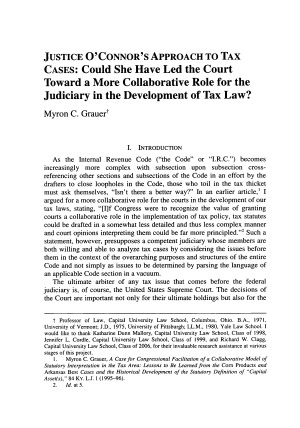Justice O'Connor's Approach to Tax Cases: Could She Have Led the Court Toward a More Collaborative Role for the Judiciary in the Development of Tax Law?
January 2007

DISCLAIMER: This text has been transcribed automatically and may contain substantial inaccuracies due to the limitations of automatic transcription technology. This transcript is intended only to make the content of this document more easily discoverable and searchable. If you would like to quote the exact text of this document in any piece of work or research, please view the original using the link above and gather your quote directly from the source. The Sandra Day O'Connor Institute does not warrant, represent, or guarantee in any way that the text below is accurate.
Article Text
(Excerpt, Automatically generated)
JUSTICE O'CONNOR'S APPROACH TO TAX
CASES: Could She Have Led the Court Toward a More Collaborative Role for the Judiciary in the Development of Tax Law?
Myron C. Grauer
INTRODUCTION
As the Internal Revenue Code ("the Code" or "I.RC.") becomes increasingly more complex with subsection upon subsection cross referencing other sections and subsections of the Code in an effort by the drafters to close loopholes in the Code, those who toil in the tax thicket must ask themselves, "Isn't there a better way?" In an earlier article,1 I argued for a more collaborative role for the courts in the development of our tax laws, stating, " [I]f Congress were to recognize the value of granting courts a collaborative role in the implementation of tax policy, tax statutes could be drafted in a somewhat less detailed and thus less complex manner and court opinions interpreting them could be far more principled."2 Such a statement, however, presupposes a competent judiciary whose members are both willing and able to analyze tax cases by considering the issues before them in the context of the overarching purposes and structures of the entire Code and not simply as issues to be determined by parsing the language of an applicable Code section in a vacuum.
The ultimate arbiter of any tax issue that comes before the federal judiciary is, of course, the United States Supreme Court. The decisions of the Court are important not only for their ultimate holdings but also for the
* Professor of Law, Capital
